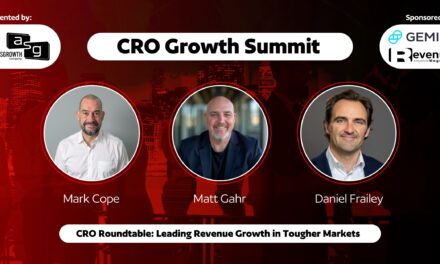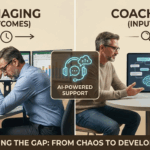
AI & CRMs: A Fugazi in the Making—Uncovering the Illusion of Intelligence in Sales Data

Picture this: a salesperson, weary from hours of navigating a complex deal, just finished a crucial call. They glance at their CRM, jot down a few quick notes, something vague about a “strong interest in the value proposition” and a tentative next step, and then move on. It’s barely a breadcrumb, and hardly enough data to give anyone a full picture of the deal’s potential or trajectory. But in today’s CRM landscape, this small scrap of information is about as deep as it goes.
This is the CRM status quo—quick, scattered notes, fragmented data points, and little context. The industry buzz around “AI-powered” CRMs promises to change this, billing them as game-changing tools with “predictive capabilities” and “intelligence” that can elevate sales processes. But dig a bit deeper, and you’ll find most AI-integrated CRMs are more like a fugazi—a flashy illusion of intelligence with little substance to back it up.
Much like a counterfeit luxury watch, AI-enabled CRMs look impressive on the surface. They’re marketed with the promise of cutting-edge intelligence, designed to suggest that they’ll pinpoint the next best move, forecast close dates, and deliver on the future of sales automation. But without substantial, well-organized data, these systems can barely scratch the surface of what AI could actually deliver.
Here’s the reality: for AI—especially large language models (LLMs)—to be effective, it needs a substantial “library” of data to learn from. This library is an expansive collection of structured records, detailed call transcripts, conversation histories, and comprehensive customer profiles that LLMs can analyze to find patterns and correlations. But current CRMs are essentially data deserts, capturing only snippets: opportunity estimates, some brief notes, and maybe a closing date here or there. In essence, salespeople add only what’s essential to get by, leaving out critical details that, if aggregated, could offer a powerful, accurate roadmap for future sales.
To truly unlock AI’s potential, the CRM system itself must evolve into something more than a simple data store; it must become a proactive partner that connects the dots between all past deals, conversations, and patterns. Imagine a CRM equipped with an LLM that can take these fragmented data points, enhance them with deep-learning intelligence, and reveal connections between customer interests, sales processes, and winning strategies. In this scenario, AI wouldn’t just show you who to call next; it would provide a data-driven roadmap detailing when to follow up, what to say, and the probability of success.
Right now, however, CRMs are designed more to gather small tidbits of data than to synthesize or predict in a meaningful way. They’re digital cabinets collecting “trinkets”—the data equivalent of shiny baubles—rather than amassing the essential data points that could turn AI’s predictive capabilities into a reality. So like a fake watch, today’s AI-enabled CRMs lack the substance and mechanisms to deliver true value, becoming merely a thin layer of flash over a hollow promise.
In my own work, I’ve found that getting valuable insights from a CRM often requires manual work. I take CRM data and run it through tools like ChatGPT to unearth correlations and trends that the CRM alone can’t deliver. By analyzing call transcripts and conversation histories, I’m able to build projections, find patterns, and refine the ideal customer profile manually—work that could and should be automated. But the systems in place today simply aren’t engineered for this depth.
This is the true potential of AI in CRMs: a system that doesn’t just store data but uses it intelligently to guide sales strategies, revealing patterns across deals and highlighting the most valuable opportunities. It’s the difference between a CRM that feels like an accessory—a fugazi—and one that’s an essential sales partner. While today’s CRMs fall short, the future holds immense potential if we can bridge the gap, capturing and structuring data in ways that allow LLMs to realize their full capability.
As AI technology advances, so too does our ability to harness data that makes sales projections accurate, relevant, and actionable. AI in CRMs doesn’t replace jobs; it enhances them, guiding us toward the most valuable aspects of the sales process and becoming an indispensable teammate in achieving sales success. When CRMs evolve from flashy but empty shells to true engines of sales intelligence, those willing to embrace the technology will have an advantage that’s hard to beat.
Today’s window is small but invaluable. For those willing to do the heavy lifting now, pulling insights manually and recognizing the limitations of current systems, the payoff could be significant. We’re standing at the edge of a new era in sales intelligence—one where every call, every interaction, and every data point feeds a library that can transform sales strategies. And for those who can see past the fugazi, the competitive advantage will be undeniable.
































